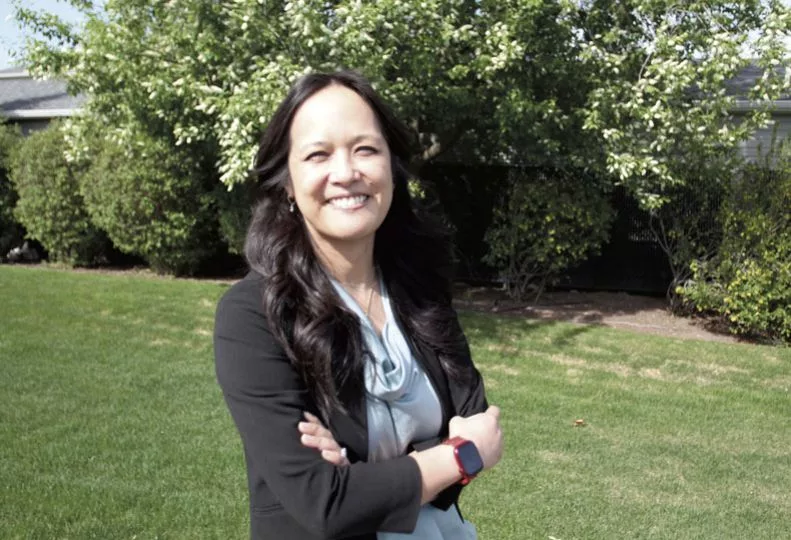
Home » Meet & Greet with Incyte Diagnostics' Mari Patel
Meet & Greet with Incyte Diagnostics' Mari Patel
~

May 11, 2023
Incyte Diagnostics, the Spokane Valley-based diagnostic pathology clinic, has promoted Mari Patel to CEO from chief operating officer.
Patel was born in Vietnam and raised in Canada and attended Loma Linda University, in California. She holds a doctorate in management and organizational leadership from the University of Phoenix. She started her career as a cytotechnician, working in a lab evaluating patients’ cell samples. Throughout the years, she has moved to the supervisory and administrative side of pathology. Prior to moving to Spokane, she was the system director for Atrium Health, in Charlotte, North Carolina.
Incyte Diagnostics is a full-service clinical lab owned by pathologists. The company has laboratories in Spokane Valley; Tukwila, Washington; and Richland, Washington. Most recently, the company opened a clinic in Post Falls in collaboration with Northwest Specialty Hospital. In 2022, Incyte produced over 600,000 slides of specimens.
Incyte has 20 shareholders and is staffed by 45 pathologists and about 350 other employees.
The Journal recently sat down with Patel to discuss her career in pathology, and what she hopes to accomplish in her new role.
What drew you to pathology?
I didn’t come from a medical family, but rather very humble beginnings. I started my journey after I lost my dad to gastric cancer. I knew then that I wanted to be in the profession. He was a mechanic, and when he got sick, it was very sudden and unexpected. I found him on the kitchen floor covered in a pool of blood when I was about 17 years old.
I took him to the hospital and sat all night while he was in emergency surgery and doctors reset three-quarters of his stomach. I remember the doctors started throwing words around that I didn’t understand. I just think back to that time, and to me, that was a sentinel event for my family. I always thought my father would live forever, so it was very shocking to me.
That started my journey and mission to help others, educate, and be that framework in the background that ensures that every specimen that goes to the lab, that I see my father in that specimen, the people I care about, or myself. We treat every specimen as if it were our own, with the same compassion and care. We ensure we do it right every time.
Why not become a doctor or surgeon?
When we go to school, most people want to grow up to be a doctor or a nurse, right? But there are heroes behind the scenes, and some wear lab coats. Being part of that process behind the scenes has really filled my bucket.
That’s why I always make a point of visiting schools and universities and teaching groups of students about the lab, because I don’t think it is always recognized as such an integral part of our medical experience. Seventy percent of the decisions made for the care of patients come from the lab, so that piece is so important. It is not only a calling but a privilege to be a part of that program.
What challenges do you foresee in your new role?
After COVID, I think the focus is on how we offer care. We must be flexible. For example, our regulatory bodies that historically did not support digital access just because it wasn’t a proven technology have granted access to emergency uses so that we can provide care in times of crisis, like the pandemic.
Learning to see what is the new normal is something we need to keep a focus on. Post-pandemic, we also must care for our teammates. Everybody is tired, and people have worked hard. When everything shut down during the pandemic, the lab didn’t shut down. The lab had to continue to work, whether we were in our biohazard suits and couldn’t even recognize our teammates.
What do you hope to accomplish in your new role?
Providing access to the community is my goal. While in the metropolitan areas, there is a lot of access and options to lab services, we are expanding our mission to serve rural communities where even big-box labs have walked away.
Last year, we were able to implement a new technology called digital pathology. Usually, pathologists need a physical slide to make a diagnosis. While digital pathology has been around, it was only recently FDA approved. Digital pathology allows our pathologist to look at slides in a digital manner that improves our efficiency turnaround time. It also ensures those patients in the rural community don’t need to wait for their specimen to be sent to a faraway lab.
It must be exciting to offer a new technology like that.
Yes, rural (patients) matter too and deserve the best quality care. We have different pathologists who specialize in different fields too. Incyte Diagnostics is definitely a clinic to follow. We have big goals, but our first priority is to care for our patients and colleagues. With that, I think we will achieve a lot of success.
Latest News Health Care
Related Articles


_web.webp?t=1769673727)
_web.webp?t=1769673728)
_web.webp?t=1769673735)
